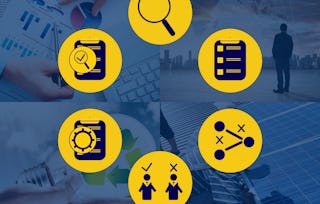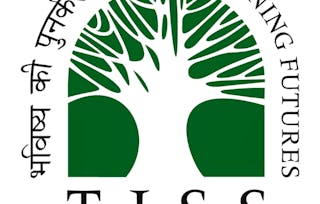This course offers a comprehensive introduction to public policy and the processes through which it is formulated, implemented, and evaluated. It addresses fundamental questions such as: Why do we need public policy? How is it made? What types of policies exist? Learners will explore the political, social, and economic contexts in which policies are developed, adopted, and assessed, gaining insights into how these factors shape outcomes.
即将结束: 只需 199 美元(原价 399 美元)即可通过 Coursera Plus 学习新技能。立即节省

您将学到什么
You will understand the public policy-making process, identify issues and assess alternatives using evidence-based approaches and analytical skills.
您将获得的技能
要了解的详细信息

添加到您的领英档案
14 项作业
了解顶级公司的员工如何掌握热门技能

该课程共有7个模块
In this module, we'll briefly cover a basic introduction to the concept of public policy, aiming to provide a clear definition and understanding of the term. We'll explore the importance of studying public policy, highlighting how it plays a crucial role in shaping society and addressing the needs of the public. Following that, we'll discuss the scope and context in which public policies are formulated and executed, providing insight into the wider framework that influences policy development. Furthermore, we will clarify how public policy stands apart from similar concepts, such as public administration and public management, illustrating the distinctive contributions of public policy. In addition, we'll cover the development of public policy as an individual academic field, exploring its evolution and significance in the realm of contemporary governance along with the methodological challenges. These video lectures give a thorough overview of fundamental concepts, setting a solid foundation for deeper investigation into this vital area.
涵盖的内容
11个视频2篇阅读材料2个作业
In this module, we will touch upon the classifications of public policy, which are split into several types that dictate the manner in which governments meet the needs of the public. Initially, we will delve into substantive and procedural policies, examining their functions in the processes of decision-making and execution. Following this, we'll look into both regulatory and self-regulatory public policies, underscoring their significance in governance and adherence. We'll also contrast material and symbolic policies, analyzing their direct outcomes or the values they communicate. Moreover, you will discover the distinctions between policies focused on collective goods versus those tailored for private goods, identifying which are designed for the benefit of the general populace and which cater to particular segments. To conclude, we will discuss distributive and redistributive public policies, focusing on how they distribute resources and modify wealth distribution across the community. Through these video segments, you'll obtain a deeper understanding of the various shapes public policies take and their effects on society.
涵盖的内容
7个视频2个作业
In this module, we will explore the diverse elements that constitute the policy environment and the roles played by various stakeholders in shaping public policy. The module begins with an introduction to the policy environment, providing an overview of the complex interplay between governmental and non-governmental actors. Learners will examine the roles of official policymakers, including the legislature, executive, administrative agencies, and the courts, and how these institutions influence policy development and implementation. The module will also cover the contributions of non-governmental participants such as interest groups, political parties, research organizations, communication and media, and citizens in the policy process. By the end of this module, learners will have a deeper understanding of the policy environment and the key actors involved in the policymaking process.
涵盖的内容
10个视频2个作业
In this module, we will briefly look at the seven stages of the policy cycle, guiding the development and implementation of public policies. We will start with identifying and prioritizing issues during agenda setting. The discussion then shifts to the selection of alternatives, the enactment, and the implementation process, shedding light on the methodologies for choosing and applying policy options. We then move on to concepts such as Micropolitics, Macropolitics, and Subsystem politics. We then focus on evaluation and understanding the policy process as a system that offers insights into the assessment of policy outcomes and the complex interrelations within the policy cycle. Towards the conclusion, we cover the actor-oriented approach to policy development and also issues with policy evaluation.
涵盖的内容
12个视频2个作业
In this module, we'll examine public policy theories and approaches that elucidate policy formulation and implementation. Starting with the institutional approach, which emphasizes the role of governmental structures, we move to group and elite theories highlighting the impact of influential groups and elites in policy-making. We then compare rational policy-making and bounded rationality, showing the difference between ideal and actual decision-making. Additionally, we discuss incremental and normative optimal models, underscoring gradual versus ideal changes, and introduce game theory and the systems approach for strategic and holistic policy perspectives. Finally, public choice theory, applying economic principles to policy decisions, is covered. Through these videos, you'll acquire a deep understanding of the frameworks analyzing public policy.
涵盖的内容
9个视频2个作业
In this module we will cover the key frameworks and approaches in public policy that help understand policy formulation and implementation. Learners will explore major frameworks such as the Stages Heuristic Model, Multiple Streams Framework, and Institutional Analysis and Development Framework by Ostrom, which focus on policy stages, a convergence of policy components, and institutional roles. The lesson also covers the Advocacy Coalition and Punctuated Equilibrium Framework, explaining policy change through interest groups and stability periods. The second lesson covers policy implementation approaches, including top-down and bottom-up models. Learners will examine the effectiveness of hierarchical control and the role of local actors in policy execution. The role of street-level bureaucrats and their discretion in shaping policy outcomes will also be discussed. By the end of this module, learners will gain a comprehensive understanding of policy frameworks and implementation approaches, enabling them to analyze and engage with policy processes critically.
涵盖的内容
8个视频2个作业
This module will cover key concepts and methodologies that shape public policy processes, focusing on behavioral science, policy transfer, ethical considerations, and decision-making styles. Learners will examine how behavioral science influences policy design through behavioral issues and nudge theory to encourage better decision-making. The module also covers path dependency and policy transfer and diffusion, emphasizing how past decisions impact present choices and how policies spread across jurisdictions. Ethical considerations and budgeting processes will be analyzed, highlighting their significance in policy planning and implementation. Finally, learners will explore policy-making patterns such as rulemaking, adjudication, and program operations, alongside decision-making styles like bargaining and persuasion. By the end of this module, learners will develop a comprehensive understanding of these aspects, enhancing their ability to engage effectively with public policy challenges.
涵盖的内容
11个视频2个作业
攻读学位
课程 是 O.P. Jindal Global University提供的以下学位课程的一部分。如果您被录取并注册,您已完成的课程可计入您的学位学习,您的学习进度也可随之转移。
位教师

从 Governance and Society 浏览更多内容
 状态:预览
状态:预览O.P. Jindal Global University
 状态:预览
状态:预览University of Michigan
 状态:预览
状态:预览Tata Institute of Social Sciences
 状态:免费试用
状态:免费试用O.P. Jindal Global University
人们为什么选择 Coursera 来帮助自己实现职业发展




常见问题
To access the course materials, assignments and to earn a Certificate, you will need to purchase the Certificate experience when you enroll in a course. You can try a Free Trial instead, or apply for Financial Aid. The course may offer 'Full Course, No Certificate' instead. This option lets you see all course materials, submit required assessments, and get a final grade. This also means that you will not be able to purchase a Certificate experience.
When you purchase a Certificate you get access to all course materials, including graded assignments. Upon completing the course, your electronic Certificate will be added to your Accomplishments page - from there, you can print your Certificate or add it to your LinkedIn profile.
Yes. In select learning programs, you can apply for financial aid or a scholarship if you can’t afford the enrollment fee. If fin aid or scholarship is available for your learning program selection, you’ll find a link to apply on the description page.
更多问题
提供助学金,



